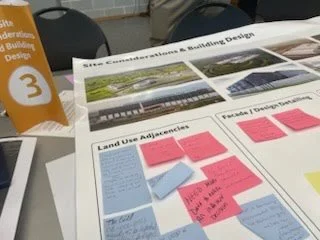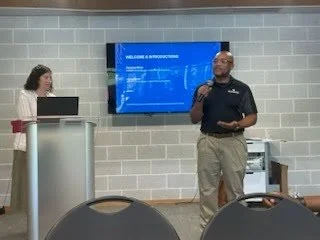South County residents share their solutions and ideas about data centers
Fort Washington, MD — Prince Georges County residents in South County shared their concerns at the prospect of a new data center coming into the county.
On July 26, around 60 Prince Georges residents attended the third and final data center meeting hosted by the architecture firm Gensler and the Maryland National Capital Park and Planning Commission (M-NCPPC) to garner community engagement. This meeting was held at the Southern Regional Technology and Recreation Complex.
James Hunt, deputy director of the Prince George's County planning department, said he’s pleased with residents' participation.
“Prince George's County residents are really engaged in these meetings, and I think it's a very important topic,” said Hunt. “Alot of them have been providing a lot of great feedback, and we greatly appreciate this. Our approach has been, and it will always be, we want to make sure that the community is first throughout this process and hearing back from them so we can provide information back to decision makers. This is critical, and we want to make sure the community understands that.”
The information session followed the same structure as the previous two. It opened with an introduction to the team sent by Gensler and an explanation of what data centers are. It then broke up into three different information sessions focused on three topics of community benefits, common concerns/mitigation strategies and site considerations/building designs. Here, residents could put forth ideas on how they wanted data centers implemented or say they didn’t want them at all.
During the discussion sessions, residents voiced their concerns about a number of issues they had with adding more data centers into the county. These reasons ranged from power usage, distance to living areas and who would be accountable for any promises or damages made by the center.
Eagle Harbor Mayor Noah Waters attended the event due to his concerns of a data center coming into his area. Waters said he doesn’t think data centers are economically sustainable and said there is a potential for longer term environmental impacts.
“There will be impacts… related to data centers,” he said.
Waters said he believes that data centers contribute to high blood pressure and heart disease. “They say the noise is incessant, and that never stops,” he said. “It's 365 days, 24 hours a day and it never, ever stops. They can never shut down.”
Waters said Maryland recognizes legacy impacts of power plants. These impacts have adversely affected people’s health and the environment, which could lead to potential lawsuits in the future. Waters argued that this would make data centers financially unstable.
Waters understands what environmental impacts can do to a community. The Maryland Department of Environmental Protection confirmed that the power plant in Eagle Harbor – a historical waterfront Black community – caused damage to its waterways, according to the Chesapeake Bay Journal.
Additionally, residents discussed data centers’ potential to raise energy costs. Recent studies have shown that data centers could increase residents' electric bills. Residents in South County have already experienced hikes in their electric bills. It’s not clear what the exact reason is for the price hikes. Those familiar with the situation, according to Maryland Matters, have said data centers could be one of the reasons for energy price hikes.
Members of the Gensler team didn’t answer questions about site choices and how data centers would impact energy costs. They said those answers were not known to them.
Residents said they were also concerned with the presenters’ lack of balance in their conversation about data centers. They felt that presenters spoke favorably about data centers. Waters said “it felt more like a sales pitch.”
“I won’t say it was intentional, but I will say it was a missed opportunity. If you’re going to say that you’re going to bring in jobs, bring a number to it, bring a timeline to it and the types of jobs there.””
Robert Johnson, a resident of Bowie as well as the director of the Bowie division of My Communities Keeper, a non-profit community support group that looks into environmental justice, said that he felt the presentation did not do a good job of addressing concerns.
Johnson said that there should have been more opportunity for an open forum to have a Q & A. He said that he had viewed the recordings of the previous meetings and this was a missed chance at both of them. Johnson also felt that presenters didn’t provide a lot of detailed information regarding potential new tech jobs that come along with adding data centers to the county.
“I won’t say it was intentional, but I will say it was a missed opportunity,” Johnson said. “If you’re going to say that you’re going to bring in jobs, bring a number to it, bring a timeline to it and the types of jobs there.”
Following this meeting, task force members will gather to discuss the data they’ve compiled from the community meetings. Then they will present their findings to the county council sometime in November.
Herbert Jones, a Fort Washington resident, who had attended the first meeting said that this was too short a time frame and did not include any chances for the community to see the findings. Jones encouraged other visitors to send a request to the council for a final community forum on the issue.
“I think we need to see that final report before it goes to the county council for approval or disapproval of data centers,” Jones said.
Read More of Our Coverage






